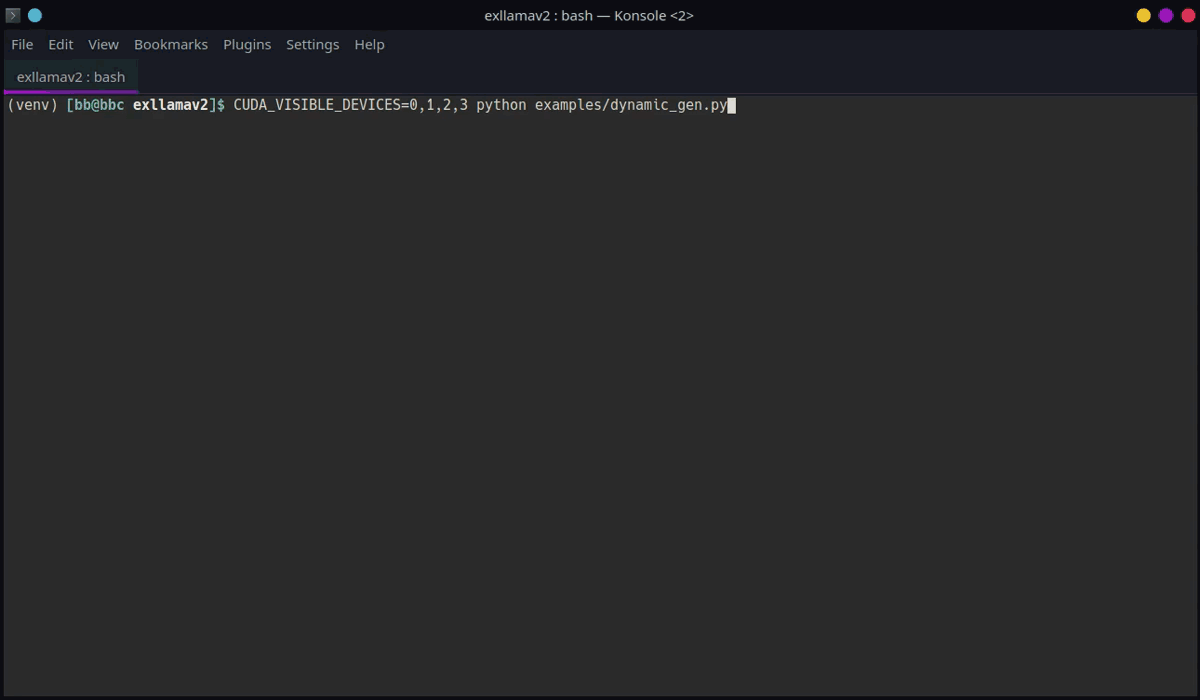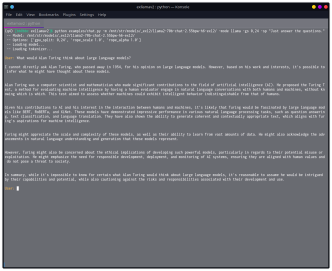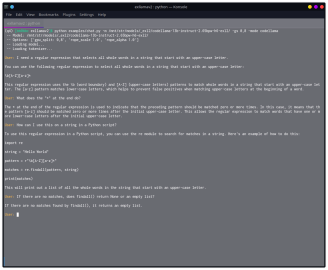ExLlamaV2 is an inference library for running local LLMs on modern consumer GPUs.
The official and recommended backend server for ExLlamaV2 is TabbyAPI, which provides an OpenAI-compatible API for local or remote inference, with extended features like HF model downloading, embedding model support and support for HF Jinja2 chat templates.
See the wiki for help getting started.
- ExLlamaV2 now supports paged attention via Flash Attention 2.5.7+
- New generator with dynamic batching, smart prompt caching, K/V cache deduplication and simplified API
The dynamic generator supports all inference, sampling and speculative decoding features of the previous two generators, consolidated into one API (with the exception of FP8 cache, though the Q4 cache mode is supported and performs better anyway, see here.)
The generator is explained in detail here.
- Single generation:
output = generator.generate(prompt = "Hello, my name is", max_new_tokens = 200)
- Batched generation:
outputs = generator.generate( prompt = [ "Hello, my name is", "Once upon a time,", "Large language models are", ], max_new_tokens = 200 )
- Streamed generation with
asyncio:job = ExLlamaV2DynamicJobAsync( generator, input_ids = tokenizer.encode("You can lead a horse to water"), banned_strings = ["make it drink"], gen_settings = ExLlamaV2Sampler.Settings.greedy(), max_new_tokens = 200 ) async for result in job: text = result.get("text", "") print(text, end = "")
See the full, updated examples here.
Some quick tests to compare performance with ExLlama V1. There may be more performance optimizations in the future, and speeds will vary across GPUs, with slow CPUs still being a potential bottleneck:
| Model | Mode | Size | grpsz | act | 3090Ti | 4090 |
|---|---|---|---|---|---|---|
| Llama | GPTQ | 7B | 128 | no | 181 t/s | 205 t/s |
| Llama | GPTQ | 13B | 128 | no | 110 t/s | 114 t/s |
| Llama | GPTQ | 33B | 128 | yes | 44 t/s | 48 t/s |
| OpenLlama | GPTQ | 3B | 128 | yes | 259 t/s | 296 t/s |
| CodeLlama | EXL2 4.0 bpw | 34B | - | - | 44 t/s | 50 t/s |
| Llama2 | EXL2 3.0 bpw | 7B | - | - | 217 t/s | 257 t/s |
| Llama2 | EXL2 4.0 bpw | 7B | - | - | 185 t/s | 211 t/s |
| Llama2 | EXL2 5.0 bpw | 7B | - | - | 164 t/s | 179 t/s |
| Llama2 | EXL2 2.5 bpw | 70B | - | - | 33 t/s | 38 t/s |
| TinyLlama | EXL2 3.0 bpw | 1.1B | - | - | 656 t/s | 770 t/s |
| TinyLlama | EXL2 4.0 bpw | 1.1B | - | - | 602 t/s | 700 t/s |
To install from the repo you'll need the CUDA Toolkit and either gcc on Linux or (Build Tools for) Visual Studio on Windows). Also make sure you have an appropriate version of PyTorch, then run:
git clone https://github.com/turboderp/exllamav2
cd exllamav2
pip install -r requirements.txt
pip install .
python test_inference.py -m <path_to_model> -p "Once upon a time,"
# Append the '--gpu_split auto' flag for multi-GPU inferenceA simple console chatbot is included. Run it with:
python examples/chat.py -m <path_to_model> -mode llama -gs autoThe -mode argument chooses the prompt format to use. raw will produce a simple chatlog-style chat that works with base
models and various other finetunes. Run with -modes for a list of all available prompt formats. You can also provide
a custom system prompt with -sp.
-
TabbyAPI is a FastAPI-based server that provides an OpenAI-style web API compatible with SillyTavern and other frontends.
-
ExUI is a simple, standalone single-user web UI that serves an ExLlamaV2 instance directly with chat and notebook modes.
-
text-generation-webui supports ExLlamaV2 through the exllamav2 and exllamav2_HF loaders.
-
lollms-webui supports ExLlamaV2 through the exllamav2 binding.
To install the current dev version, clone the repo and run the setup script:
git clone https://github.com/turboderp/exllamav2
cd exllamav2
pip install -r requirements.txt
pip install .By default this will also compile and install the Torch C++ extension (exllamav2_ext) that the library relies on.
You can skip this step by setting the EXLLAMA_NOCOMPILE environment variable:
EXLLAMA_NOCOMPILE= pip install .This will install the "JIT version" of the package, i.e. it will install the Python components without building the
C++ extension in the process. Instead, the extension will be built the first time the library is used, then cached in
~/.cache/torch_extensions for subsequent use.
Releases are available here, with prebuilt wheels that contain the extension binaries. Make sure to grab
the right version, matching your platform, Python version (cp) and CUDA version. Crucially, you must also match
the prebuilt wheel with your PyTorch version, since the Torch C++ extension ABI breaks with every new version of
PyTorch.
Either download an appropriate wheel or install directly from the appropriate URL:
pip install https://github.com/turboderp/exllamav2/releases/download/v0.0.12/exllamav2-0.0.12+cu121-cp311-cp311-linux_x86_64.whlThe py3-none-any.whl version is the JIT version which will build the extension on first launch. The .tar.gz file
can also be installed this way, and it will build the extension while installing.
A PyPI package is available as well. This is the same as the JIT version (see above). It can be installed with:
pip install exllamav2ExLlamaV2 supports the same 4-bit GPTQ models as V1, but also a new "EXL2" format. EXL2 is based on the same optimization method as GPTQ and supports 2, 3, 4, 5, 6 and 8-bit quantization. The format allows for mixing quantization levels within a model to achieve any average bitrate between 2 and 8 bits per weight.
Moreover, it's possible to apply multiple quantization levels to each linear layer, producing something akin to sparse quantization wherein more important weights (columns) are quantized with more bits. The same remapping trick that lets ExLlama work efficiently with act-order models allows this mixing of formats to happen with little to no impact on performance.
Parameter selection is done automatically by quantizing each matrix multiple times, measuring the quantization error (with respect to the chosen calibration data) for each of a number of possible settings, per layer. Finally, a combination is chosen that minimizes the maximum quantization error over the entire model while meeting a target average bitrate.
In my tests, this scheme allows Llama2 70B to run on a single 24 GB GPU with a 2048-token context, producing coherent and mostly stable output with 2.55 bits per weight. 13B models run at 2.65 bits within 8 GB of VRAM, although currently none of them uses GQA which effectively limits the context size to 2048. In either case it's unlikely that the model will fit alongside a desktop environment. For now.
A script is provided to quantize models. Converting large models can be somewhat slow, so be warned. The conversion script and its options are explained in detail here
A number of evaluaion scripts are provided. See here for details.
A test community is provided at https://discord.gg/NSFwVuCjRq Quanting service free of charge is provided at #bot test. The computation is generiously provided by the Bloke powered by Lambda labs.
-
I've uploaded a few EXL2-quantized models to Hugging Face to play around with, here.
-
LoneStriker provides a large number of EXL2 models on Hugging Face.
-
bartowski has some more EXL2 models on HF.


